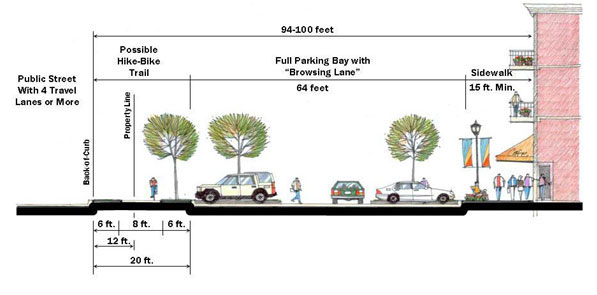Driven by New Urbanism, more than two dozen communities in the U.S. have loosened zoning restrictions in recent years. Cities are opting to use form-based codes, a concept less concerned with the use of buildings and more with their appearance and the way they relate to each other.
The goal of city planners is to shape the streetscape according to a vision for a neighborhood. The new approach has been called “performance-based zoning.” An example is a large development in Fremont, Calif., where the city council changed its approach to zoning on a nearly 900-acre development adjacent to a light rail station.
Planners started with several goals—a certain number of jobs, a certain number of homes including affordable homes, and strict standards for a low carbon footprint. The developers were allowed to design the project as they saw fit as long as they could achieve those goals.
The performance-based approach is contrary to the principle of separation of uses that led to color-coded zoning maps pinned up in most town halls. According to the old philosophy, ach zone had its own designated use: residential, commercial, or industrial. This method is increasingly seen as inappropriate for urban development—especially infill, downtown, and transit-oriented projects.
(http://www.citylab.com/housing/2014/08/braving-the-new-world-of-performance-based-zoning/375926/)
Related Stories
| Feb 8, 2012
Controversy over pay for prisoners on roofing job in Michigan
The disagreement was over whether the prisoners should have been paid prevailing wage for their brief time on the job because the project was paid for with a U.S. Department of Energy grant.
| Jan 30, 2012
ZigBee and ISO 50001: Two new standards to make buildings greener
These developments demonstrate the dynamic nature of the market and the continued need for development of program standards of many different types that help builders and owners translate high performance and sustainable buildings goals into practical measures on the ground.
| Jan 30, 2012
New firm-fixed-price rules on federal contracts impact construction industry
Contractors will need to be on the lookout for policies such as the Contractor Accountability for Quality clause.
| Jan 30, 2012
Roofer’s fatal plunge demonstrates need for fall-prevention regulations
“The biggest problem is getting our workers to use the equipment,” says Michael J. Florio, executive director of the organization.
| Jan 26, 2012
Tampa moves to streamlined online permitting system
The system will replace an inefficient patchwork of old software and is designed to provide businesses, homeowners, and contractors with online access to permitting and licensing information.
| Jan 26, 2012
EPA to collect more data, seek comments before finalizing mud rule
The EPA says it will seek more data and is accepting comments until March 5.
| Jan 26, 2012
Industry challenges Connecticut's suit over defective construction work
The dispute arose over multimillion-dollar leaks at the University of Connecticut's law library.
| Jan 26, 2012
Earthquake 'fuse' could save buildings during temblors
The idea is to use an earthquake "fuse" that can prevent the tiny fractures and warps that make structures unsafe after a quake and very expensive to repair.
















